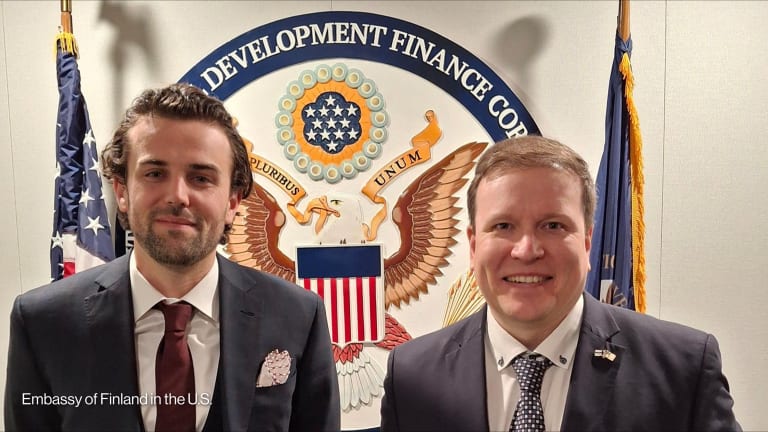
Plan International, the international children’s rights NGO, is further specializing its focus to prioritize the needs and rights of girls. The specialization is seen as a way of working toward the Sustainable Development Goals, but the international development environment is also ripe for transformation, the organization’s Chief Executive Officer Anne-Birgitte Albrectsen told Devex.
“We really feel the SDGs are such a powerful vehicle. We have a common strategic overlay, which the Millennium Development Goals did not quite do for us, and now it is really interesting to see how the conversation has changed,” she said.
In a recent conversation with Devex, Albrectsen, the former assistant-secretary general at the United Nations Population Fund, discussed how Plan is changing and what growing pains might come with it. The conversation has been edited for length and clarity.
Where are you trying to take Plan and why is there a need for a change of direction?
The development sector is being impacted by a whole number of different trends that we are all trying to respond to in one way or another. The primary trend is that, historically, we have a positive moment of global consensus around sustainable development. Embedded in that are some really key changes that we all need to be working on and reflecting on.
“Even if we just kept doing really, really good work, there is no way we would reach the SDGs. So every single player in the sector needs to be thinking about what we can be doing differently to fuel those SDGs.”
— Anne-Birgitte Albrectsen, CEO of Plan InternationalOne of the intents in our strategy, apart from the increased focus on the girl child, is to become a truly universal organization where, no matter where you work, you are locally embedded — you are part of a local civil society organization and you have a full voice within the organization.
For the SDGs to really come alive, even if we just kept doing really, really good work, there is no way we would reach the SDGs. So every single player in the sector needs to be thinking about what we can be doing differently to fuel those SDGs.
Q&A: Plan International CEO on legitimacy in a moment of populism
Devex spoke with Plan International CEO Anne-Birgitte Albrectsen on the sidelines of the World Economic Forum in Davos, Switzerland. She talked about a need for NGOs to better engage with those they help and how the aid sector can work with businesses and technological innovators.
There is intersectional work going on across all the SDGs, and promises made to girls and women across every goal, except the oceans goal. If we could focus our assets on simply making a change for the girl child, understanding that the girl child who is empowered, well-educated etc., has such an impact on everything we do, maybe that can be our contribution to reaching the SDGs. It does differentiate us, as well, in a global marketplace where there are many, many actors. We would like to stand out for the right reasons, because those are the results we would like to achieve, but also because we need to be distinctive for resource mobilization purposes.
Does this mean that, as part of the strategy, you are trying to move from children’s rights work to mainstreaming the rights of girls?
“We take it further than mainstreaming ... Every single project we do has to really seek out the root causes of discrimination against the girl child.”
— Anne-Birgitte Albrectsen, CEO of Plan InternationalWe actually take it further than mainstreaming. We are basically saying that by the end of our five-year strategy, every single project we do has to really seek out the root causes of discrimination against the girl child, and have embedded in it some challenging elements on social change. So we distinguish between our projects being gender aware — which is our shorthand for gender mainstreaming — and being gender transformative.
It is quite a change. I think we calculate right now that close to 100 percent of our programs are gender aware, and around 25 percent of our programs to date are truly gender transformative — challenging deep gender norms and discrimination. By the end of the five-year cycle, we want every program to be gender transformative.
What are the challenges in reworking your strategy like this?
We hope that there are two countervailing forces. As we move to places where the most vulnerable girls are, we may be increasing our expenses for security or logistics. We are already working in several conflict-affected areas, but there are a number of countries that are on the list of where it is worst to be a girl in the world that we are not working in. So we will be making some choices in terms of really engaging in some of those countries, which will mean cost increases. On the other hand, we believe that if we work through greater partnerships with others, as we focus our work not just on program delivery, but also on really effective advocacy and policy changes, that can also allow us to reduce costs. We are hoping that ultimately, by the end of the five-year period, our running costs will be lower but our impact will be higher.
You started at Plan International 18 months ago as its president and CEO. How was the transition, coming from your previous work in government and at the U.N?
I have gone through a few of those transitions. I moved from the Danish Foreign Service and a sort of government environment into the U.N., and now into the nonprofit sector. There is no doubt that moving into the NGO sector is a somewhat liberating experience, in the sense that when you work for government you are strictly bound by that particular government’s interests at any given time. And moving to Plan, while it is a membership organization with many different members from all over the world, our purpose and focus are so clear. In terms of my own voice and agency, that is where the liberation comes in — being able to speak to issues with more strength and clarity from a personal perspective, without constantly having to watch for the political balances in what one says.
“There is no doubt that moving into the NGO sector is a somewhat liberating experience.”
— Anne-Birgitte Albrectsen, CEO of Plan InternationalThere is a lot to learn from the change processes, whether driven by austerity measures or repositioning efforts in Europe, or work at the U.N. Development Program, or UNFPA, so I bring with me the experience of having been part of some pretty complex change processes across government institutions to global organizations. I don’t think I could be effective in my current job at Plan, rethinking its own purpose and strategy and business model, without having had that experience.
You have experienced almost all sides of the spectrum, except for the private sector.
I don’t have the private side [experience] yet — although, it is interesting because Plan is one of the large NGOs that has the greatest diversity in corporate partners. We have some 500 corporate partnerships we work with on all aspects: Child rights, girls’ rights, youth employment and so on. My interaction with the private sector has probably never been larger than it is now.
Read more international development news online, and subscribe to The Development Newswire to receive the latest from the world’s leading donors and decision-makers — emailed to you free every business day.








